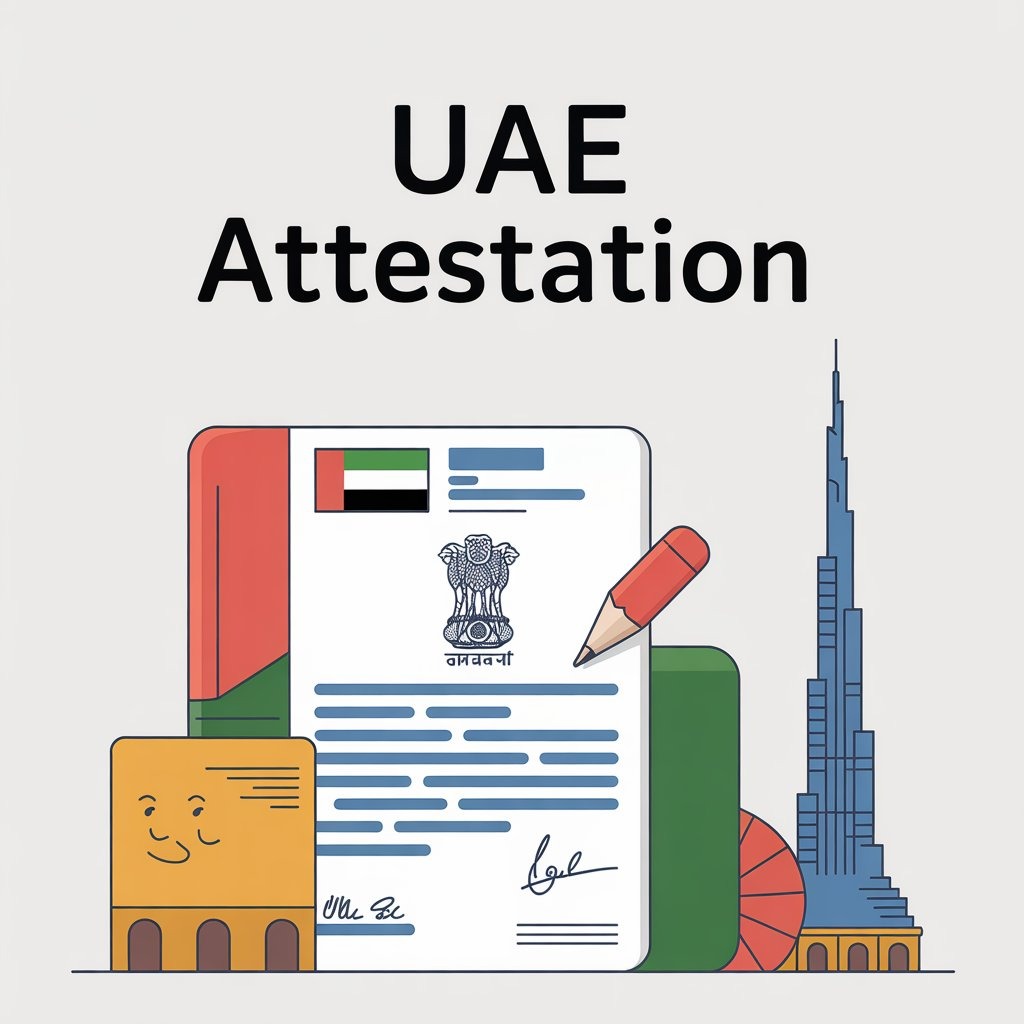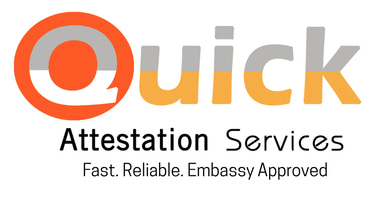UAE Embassy Attestation Made Simple
Discover everything you need to know about UAE embassy attestation, including visa attestation and document requirements. Simplify your attestation process with our comprehensive guide.
10/29/20257 min read


Understanding Attestation and Its Importance
Attestation refers to the process of verifying the authenticity of a document, ensuring its validity through official endorsement. In the context of the UAE, this procedure plays a pivotal role for expatriates and individuals aiming to undertake various activities such as employment, education, or business operations within the country. The UAE's rapid development and its appeal as a global hub necessitate that foreign nationals provide legitimate documents to meet legal and administrative requirements.
The importance of UAE embassy attestation cannot be overstated. This form of verification serves as a seal of approval which confirms that the documents submitted—be they academic certificates, professional qualifications, or personal documents—are genuine and recognized. Such validation is essential, particularly for expatriates seeking employment, as employers often require attested documents to finalize hiring processes. Without proper attestation, candidates may risk non-acceptance or face delays in job offers, significantly impacting their career prospects.
Moreover, attestation extends beyond employment purposes; it is equally vital for educational pursuits. Students aiming to enroll in universities or colleges in the UAE must present attested academic records. These records assure educational institutions of the legitimacy of the applicant's qualifications, facilitating a smoother admission process. Similarly, for business-related activities, such as establishing a company or entering into contracts, attested documents act as a safeguard against fraud and misrepresentation, fostering trust and credibility in legal agreements.
In conclusion, the process of document attestation by the UAE embassy is indispensable for expatriates. It not only serves to authenticate documents but also ensures compliance with local laws, thereby enabling individuals to seamlessly integrate into the UAE's dynamic environment.
Types of Documents That Require Attestation
Attestation is a crucial process that validates certain documents for use in various official capacities, especially in a foreign country like the UAE. A variety of documents may require attestation from the UAE embassy or consulate for them to be recognized as legally valid. Understanding which documents require this authentication is essential for individuals and businesses operating or residing in the UAE.
One of the primary types of documents that require attestation is educational certificates. This includes degrees, diplomas, and transcripts from recognized institutions. Attestation of these documents is often necessary for further studies, job applications, or professional licensing within the UAE. The process ensures that the educational qualifications are legitimate and meet the standards set by local authorities.
Marriage certificates are another significant type of document that necessitates attestation. Couples who are planning to reside in the UAE may need to provide attested marriage certificates for residency applications or for legal matters that require proof of marital status. The attestation process verifies the legitimacy of the marriage and ensures that it is recognized by UAE law.
Similarly, birth certificates also require attestation, particularly for expatriates wishing to enroll their children in schools or for residency applications. An attested birth certificate serves as a formal identification document that proves the child’s age and relationship to the parents, which is crucial for educational and legal processes.
Lastly, business documents such as memorandum of association, articles of incorporation, and commercial licenses often require attestation for companies wishing to engage in business activities within the UAE. This process affirms the authenticity of the company’s legal formation and is typically required for contracts, partnerships, and compliance with local regulations.
The Attestation Process: Step-by-Step Guide
Obtaining UAE embassy attestation for documents is an essential step for those aiming to use their paperwork in the United Arab Emirates. The process can appear daunting; however, a systematic approach can make it manageable. Here is a step-by-step guide to ensure you understand and follow the proper procedures effectively.
First, begin by gathering all necessary documents that require attestation. Typical documents include educational certificates, marriage certificates, and commercial documents. Ensure that these documents are in their original form as well as any required photocopies. Once you have collected all relevant paperwork, the next step is to verify that they are duly signed and notarized by a recognized authority if needed, as having official notarization is often a prerequisite.
Next, you will need to approach the appropriate Department of Foreign Affairs and Trade (DFAT) or the Ministry of External Affairs (MEA) in your home country for initial verification and authentication. This process may involve filling out forms and paying a fee; ensure you retain all receipts and confirmation documents.
After you have completed the initial authentication, it is time to submit your documents to the UAE embassy or consulate. Check the specific requirements of the UAE mission in your country, as there can be variations based on location. Most embassies offer an online appointment system for document submission, which you should utilize to ensure a smooth process.
Once your documents are submitted, track their status through the embassy's tracking system or inquire directly if necessary. Upon completion of the attestation process, the UAE embassy will return your documents with the official attestation stamp affixed. This stamp certifies that your documents are valid and recognized by UAE authorities, allowing you to use them for your intended purpose in the UAE.
Common Challenges and How to Overcome Them
The process of UAE Embassy attestation can often present various challenges that may lead to delays or rejections. Understanding these potential pitfalls is crucial for individuals and businesses seeking a smooth attestation journey. One of the most common challenges is documentation errors. Minor mistakes in personal information, such as names or dates, can cause documents to be rejected or returned for correction.
To mitigate this risk, it is essential for applicants to carefully review all documents before submission. Employing checklists can be immensely helpful, ensuring that all necessary documents are collected and verified. Moreover, it is advisable to seek professional assistance, particularly for complex documents, to minimize the chance of errors.
Another prevalent issue during the attestation process is delays, which can arise due to several factors, including high volumes of applications during peak seasons. It is recommended to plan ahead and allow ample time for the entire attestation process, from document preparation to submission at the embassy. Checking the embassy’s official website for current processing times can provide valuable insights and aid in setting realistic expectations.
Additionally, some applicants may encounter difficulties related to specific document types, especially academic certificates or corporate papers, which may have unique attestation requirements. In such cases, reaching out to the relevant authorities or organizations to confirm requirements beforehand can prove beneficial. This proactive approach ensures that the documentation aligns with the specific attestation guidelines set by the UAE Embassy.
In conclusion, navigating the common challenges of UAE Embassy attestation requires diligence, organization, and, when necessary, professional guidance. By being well-prepared and informed, applicants can effectively address issues such as document rejections and delays, facilitating a smoother attestation process.
Fees and Timeframes: What to Expect
When navigating the process of UAE embassy attestation, it is crucial to understand the associated fees and the typical timeframes for each type of document. The costs of attestation can vary significantly based on the document type, the issuing authority, and the urgency of the service requested. Generally, a standard range for the attestation fees can be expected between $50 to $200 per document. However, additional charges may apply for expedited services, which can push the total fees beyond the initial estimates.
For instance, educational certificates, such as degrees, diplomas, and transcripts, usually command higher fees when compared to personal documents like marriage or birth certificates. Furthermore, depending on the service provider, some may bundle the attestation fees with notary services, translating to a more economical option in the long run. Prospective applicants are encouraged to inquire about any hidden costs that may not be initially disclosed to avoid budgetary overages.
Regarding timeframes, individuals can anticipate that the embassy attestation process typically takes between 3 to 7 working days for standard processing. However, this duration can vary based on several factors, including the embassy's workload and the specific requirements of the documents. For those requiring expedited services, processing may be completed within a more concise timeframe of 1 to 3 days. It is advisable to plan ahead and allow extra time when submitting documents for attestation to ensure no last-minute delays affect your plans.
Ultimately, setting realistic expectations regarding fees and timeframes will enable applicants to better plan their document requirements when seeking attestation services from the UAE embassy.
Using Professional Services for Attestation
When it comes to UAE embassy attestation, opting for professional services can provide significant advantages over managing the process independently. Navigating the complexities of document attestation requires a thorough understanding of the legal framework, specific requirements, and procedures mandated by the UAE authorities. Professional services are well-acquainted with these nuances, thereby facilitating a smoother and more efficient process.
One of the key benefits of engaging an attestation service provider is reliability. Established agencies often have a proven track record in handling attestation processes, which can be crucial in ensuring that your documents are processed accurately and without delay. Furthermore, many professional services maintain close relationships with embassy personnel, which can expedite the verification process and help avoid common pitfalls that less experienced individuals might encounter.
Another important factor to consider is customer reviews. An agency’s reputation can provide valuable insights into their service quality and effectiveness. Potential clients are encouraged to research online reviews and testimonials to gauge the experiences of others. A strong reputation backed by positive feedback can be a strong indicator of a company’s reliability and capability in managing UAE embassy attestation.
Pricing is also an essential aspect when selecting a professional service. While it may be more cost-effective to handle attestation independently, unforeseen complications could lead to additional expenses or time lost. Comparatively, professional services often provide transparent pricing structures, detailing all potential costs upfront. By examining various options and considering the balance of cost versus expertise, individuals can make informed decisions on whether to enlist professional services or undertake the attestation process themselves.
Final Tips for Successful Attestation
Successfully navigating the attestation process, particularly for documents requiring UAE Embassy attestation, can be accomplished with careful preparation and diligence. Firstly, ensure that all documents are correctly prepared before submission. This includes systematically checking for any required signatures, seals, or formats that the embassy mandates. In many cases, missing documentation or improper formatting can lead to delays. To avoid such hiccups, consult the relevant embassy guidelines or obtain assistance from professional service providers specializing in UAE attestation.
Effective communication with the embassy or your selected service provider is vital. Keep lines of communication open and feel free to reach out with any questions or concerns regarding your attestation status. It’s advisable to maintain written records of all interactions, as this can serve as reference material if discrepancies arise later. Timeliness is also crucial; any changes to your timeline should be communicated promptly to avoid processing interruptions.
Another significant tip involves verifying the authenticity of the attested documents upon receipt. Upon completion of the attestation process, scrutinize all received documents for any inconsistencies. This includes cross-referencing with original documents to ensure that all information has remained accurate and intact. Should you encounter any errors, it is imperative to rectify them immediately, as this will aid in maintaining the validity of your documents for future use. Additionally, familiarize yourself with the local laws and requirements in the UAE related to document usage, as these can impact the purpose and acceptance of your attested documents.
By following these practices and remaining proactive, you will be better equipped to manage the intricacies involved in the UAE Embassy attestation process, ultimately simplifying your experience.
